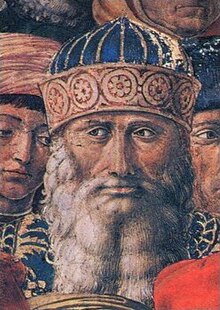
Georgius Gemistus ( 1355-1452 ) — later called Plethon or Pletho — was a Greek scholar of Neoplatonic philosophy. He was one of the chief pioneers of the revival of Greek learning in Western Europe. In the dying years of the Byzantine Empire, he advocated a return to the Olympian Gods of the ancient world.
He re-introduced Plato's thoughts to Western Europe during the 1438 - 1439 Council of Florence, a failed attempt to reconcile the East-West Schism . Here Pletho met and influenced Cosimo de' Medici to found a new Platonic Academy , which, under Marsilio Ficino , would proceed to translate into Latin all Plato's works, the Enneads of Plotinus, and various other Neoplatonist work.
George Gemistos was born in Constantinopolis As a young man he went to study at Adrianopolis. He admired Plato so much that late in life he took the similar-meaning name Plethon. Gemistos left Adrianopolis and travelled through Cyprus and Palestine and other places, in the Despotate of Morea. There he taught wrote astronomy, philosophy, history and geography.
Plethon was the author of De Differentiis, a detailed comparison between Plato and Aristotle's conceptions of God. He also wrote a Summary of the Doctrines of Zoroaster and Plato, which detailed his own eclectic polytheistic beliefs. These works did not help to clear him of the charge of heresy. He also wrote a number of works on geography, music and other subjects.Plethon was chosen to accompany Emperor John III to Italy in his attempt to unify the Orthodox and Catholic Church.
At the invitation of some Florentine humanists he set up a temporary school to lecture on the difference between Plato and Aristotle. Cosimo de Medici attended these lectures and was ispired to found the Accademia Platonica in Florence. Because of this, Plethon is considered one of the most important influences on the Italian Renaissance.
1. Georgios Gemistos was called also Plethon because of
a. Plato
b. Aristotle
c. Sokrates
d. Pythagoras
2. He was a
a. mathematician
b. philosopher
c. painter
d. musician
3. He travelled to
a. Cyprus
b. Palestine
c. Florence
d. all the above
No hay comentarios:
Publicar un comentario